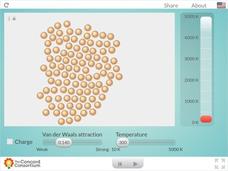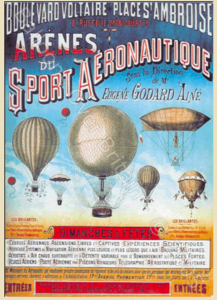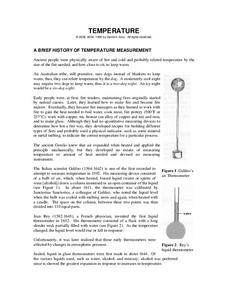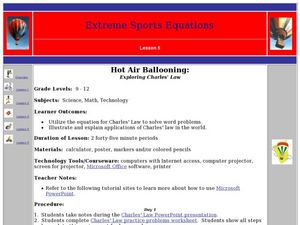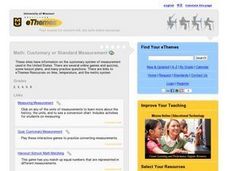Science Geek
Measurement of Pressure and Temperature
We all have standards and scientists are no exception. Presentation covers standard temperature, standard pressure, temperature conversions, and absolute zero. It explains pressure using pascals, mm of mercury, atmosphere, and torr, then...
Royal Society of Chemistry
Gas Laws: Converting Units
Given a choice between playing a game or completing a worksheet, which do you think your class would choose? Tap into their reasoning skills with a series of puzzles focused on gas laws unit conversion. You can use the resource online or...
University of Texas
Lives of Stars
Stars exist from a few million years to over 10 billion years, depending on their mass. Scholars perform a play acting as stars to learn about their different life cycles. They develop an understanding of many of the fundamental concepts...
Concord Consortium
Boiling Point of Polar and Non-Polar Substances
Go to extremes to illustrate boiling point! Junior chemists explore the effects of heating and cooling on polar and non-polar substances. The interactive allows users to raise and lower the temperature, set specific temperatures, and...
Concord Consortium
Boiling Point
Is it getting hot in here? Observe boiling from inside a beaker in an engaging interactive. Chemistry scholars heat and cool polar and non-polar solids and observe how molecules react to temperature changes. Your class' misconceptions...
Concord Consortium
Charged and Neutral Atoms
Do charged and neutral particles behave differently as they undergo phase changes? Science sleuths examine two types of attractive forces using an informative interactive. Pupils can vary the amount of Van der Waals attraction present...
Concord Consortium
The Temperature-Pressure Relationship
Turn up the heat! What happens to the pressure in a closed system as temperature changes? Enhance your chemistry class' understanding of the gas laws with an illustrative interactive. Pupils change the Kelvin temperature before observing...
Concord Consortium
The Temperature-Volume Relationship
What effect does temperature have on the volume of a gas? Observe the temperature-volume relationship through an animated simulation. The user controls the temperature, and a moveable piston reacts to increased or decreased thermal...
Concord Consortium
Seeing Specific Heat and Latent Heat
What happens inside a melting solid? Prospective physical chemists observe a solid-to-liquid phase change at the molecular level using an inspired interactive. Pupils add heat to a close system, then monitor changes in kinetic and...
Illustrative Mathematics
Temperature Conversions
Complete two conversions at once using compositions. Pupils use the conversion formulas for temperatures to calculate a formula to convert directly between Kelvin and Fahrenheit. Classmates determine the meanings of composition...
Science Geek
Kinetic Molecular Theory
The fourth presentation in a series of five begins with information about the nature of gases and what to expect from them. Then it discusses kinetic molecular theory, diffusion, and Graham's Law, and concludes with the purification of...
Science Geek
Gas Laws
A physical science presentation begins with an explanation of ideal gases and their behavior. Then it introduces all of the gas laws with descriptions and formulas.
Chymist
Temperature
Three Dog Night isn't just the name of a band; it is also the way an Australian tribe, who used dogs to stay warm, would describe the temperature on a cool evening. After reading about many different ways of measuring temperature, the...
PHET
Planet Designer: Kelvin Climb
It's time to get those creative juices flowing! This second lesson in a series of five continues allowing pupils to design their own planets. It the same format as the first, but, this time, allows students to alter greenhouse gases...
Curated OER
The Fabled Maine Winter
Students graph and analyze scientific data. In this research lesson students use the Internet to obtain data then draw conclusions about what they found.
Curated OER
Differences Between Ground and Air Temperatures
Students examine the differences between air temperature and ground temperature. In this investigative lesson students find NASA data on the Internet and use it to create a graph.
Mr. E. Science
Thermal Energy and Heat
The presentation covers Fahrenheit, Celsius, and Kelvin scales for temperature as well as conduction, convection, and radiation.
Curated OER
Hot Air Ballooning: Exploring Charles' Law
Students solve word problems dealing with Charles' Law. In this Charles' Law lesson, students observe PowerPoint presentations concerning Charles' Law. They complete a WebQuest and describe the relationship between hot air balloons and...
Curated OER
SI Units
In this SI units worksheet, students solve 6 problems including converting from one unit of measurement in the metric system to another, estimating the mass of objects, and using the density of a metal to find its volume given the mass.
Curated OER
Temperature Scales
Eighth graders explore how to read a thermometer. They convert temperature between Celsius, Fahrenheit and Kelvin. Students explain that Celsius is used in the Scientific community and Fahrenheit is used basically only in the United...
Curated OER
Charles's Law
In this Charles's Law worksheet, students review the Kelvin temperature scale, how volume varies with temperature, and Charles's Law. This worksheet has 4 problems to solve.
Curated OER
Temperature Conversions
In this temperature worksheet, students practice converting temperatures front Fahrenheit to Celsius, Celsius to Fahrenheit, and Celsius to Kelvin. This worksheet has 15 problems to solve.
Curated OER
Alkanes and Alkenes
In this alkanes worksheet, students use a data table to plot a graph of boiling point against number of carbon atoms. Students define cracking and double bond. This worksheet has 5 short answer questions.
Curated OER
Math: Customary or Standard Measurement
Students examine resource links to examine types of measurement. They play interactive games to practice conversion. They inspect digital and analog clocks as well as the three temperature scales,







